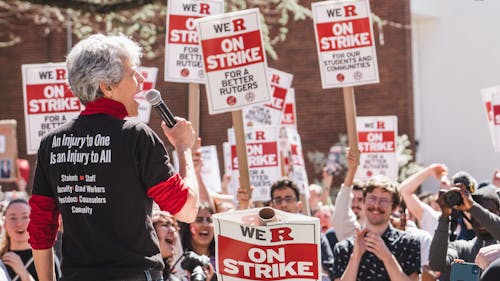Faculty strike day 1: Adjunct faculty, graduate students provide their picket line perspectives
Today marks the first day of the first teaching strike in Rutgers' 257-year history. Full-time professors, adjunct faculty, graduate workers and undergraduates participated in picket line demonstrations across all three University campuses in support of Rutgers' faculty unions.
The strike follows months of stalled contract negotiations between the University and the Rutgers chapter of the American Association of University Professors and American Federation of Teachers (AAUP-AFT), the Rutgers Adjunct Faculty Union (PTLFC) and the American Association of University Professors at the Biomedical and Health Sciences of New Jersey (AAUP–BHSNJ).
In New Brunswick, picket lines formed on all five campuses, with demonstrators chanting pro-labor slogans, singing, breakdancing, conducting dialogues with each other and holding up both printed and handmade signs.
Mich Ling, a doctoral student in the Department of Women's, Gender and Sexuality Studies, said they and other demonstrators marched from the Cook and Douglass campuses to the College Avenue campus, where they met other strikers at Voorhees Mall.
"We took to the streets. We marched down George Street, and we ended up here at Voorhees (Mall) collectively," they said. "We had our safety marshals with us who were corresponding with bystanders and police."
Ling said this strike demonstrates the power of unions at the University, as evidenced by the high percentage of union members who voted to authorize the strike in March.
Nancy Wolff, a distinguished professor in the Edward J. Bloustein School of Planning and Public Policy, said she attended the demonstrations not only to support the unions but also to hold University President Jonathan Holloway accountable.
"I'm out here because we hired a president that came to Rutgers beating the drum of diversity, equity and inclusion," she said. "Since he's been here, he's only found the beat for diversity. We are calling him out today to find the other beats and to join the beat of our beloved community, which also believes in equity and inclusion."
Wolff said that though she is not teaching a course this semester, she will forgo her administrative duties during this time. Still, she maintains contact with students to offer them guidance during the strike, which she says serves as a lesson on the importance of calling out injustice.
"I feel like this is a message that students need to get because we're in a time in our country when we need to stand up and say, 'This is not right.' And we are doing that here today at Rutgers, and this is a very important learning experience for students," she said.
As for the future of the strike, Wolff said she hopes the University will hear the unions' concerns and negotiate with them thoughtfully.
"It's embarrassing how the University has treated our labor team and how protracted these contractual discussions have been — we just don't treat each other like that," she said.
She said the University requires employees to live in New Jersey, but the current compensation for workers does not sustain the cost of in-state living.
Charlotte Olsen, a doctoral student in the Department of Physics and Astronomy, also discussed the difficulties faced by employees, specifically graduate workers, when attempting to sustain themselves on a University salary.
She said that many graduate workers struggle to pay for basic necessities, like rent and food, despite the value they bring to the University in terms of research produced.
"This is an R1 institution where we are doing some of the most cutting-edge research in the world, not just in the country," Olsen said. "The people who are largely doing this type of labor are our graduate researchers and our (postdoctoral researchers)."
Ling said that Rutgers' graduate workers earn between $20,000 to $30,000 annually, which is significantly lower than the living wage in New Jersey.
They also drew a distinction between the treatment of graduate or teaching assistants and graduate fellows, saying that the latter is unable to access key resources.
Ling, who has held fellowships and teaching assistant positions, says they do the same work across both roles. Despite these shared duties, the University recognizes graduate fellows as students, meaning they are denied employee health insurance and excluded from being represented by the faculty union.
"(Rutgers administration) considers fellows to be students. And they treat us like students," they said. "It's a very infantilizing thing because a lot of (graduate fellows) are parents, a lot of (graduate fellows) support their families. They're caretakers."
In addition to their academic responsibilities, many graduate fellows work multiple jobs to support themselves, even though the University requires them to formally record that they are not employed anywhere, Ling said.
Robert Bernotas, an adjunct professor in the Department of Music, said that when he was an undergraduate at Rutgers, most of his courses were taught by tenure-track faculty. The rise in the amount of adjunct faculty at universities has been a recent occurrence.
Elisheba Haqq-Stevens, an adjunct professor in the English Department's Writing Program, said having adjunct instructors benefits students, as they often have unique work experience that can be incorporated into the classroom.
Specifically, combining the research and academic knowledge of full-time faculty and the real-world experiences of adjunct faculty can help improve students' learning experiences, she said.
The two also spoke about Holloway's usage of the phrase "beloved community," with Haqq-Stevens saying that the phrase falsely implies the University will care for its employees. Bernotas said that any existing "beloved community" is formed by Rutgers' labor groups and allies.
Regarding Holloway suggesting a possible legal injunction against the strike, Haqq-Stevens said she did not understand the reasoning behind this potential move on the University's part, especially since the ability to advocate against injustices, including labor issues, is a fundamental American principle.
As picket lines continued from 9 a.m. to 5 p.m. on Rutgers campuses, bargaining representatives from the AAUP-AFT and the University traveled to Trenton to conduct negotiations at the New Jersey State House with Gov. Phil Murphy (D-N.J), who called for the meeting yesterday.
In a University-wide email today, Holloway referenced this meeting and said Murphy asked the Rutgers administration not to file a legal injunction against the strike.
He said that the University agreed to this request in view of how the bargaining process has been advancing. Still, Holloway maintained that an injunction could be filed if no additional progress is made toward a negotiation resolution.
"Obviously, if there is no movement towards an agreement, we will have no choice but to take legal action to assure the continued academic progress of our students and prevent irreparable harm," he said.
Additionally, in the email, Holloway said the University administration had received word of demonstrators disturbing classes that were in session.
"In one instance, protesters actually entered a class where a critical exam was being conducted," he said. "While I respect the right of people to peacefully protest, there is no excuse for interfering with classes being taught by faculty who are choosing to continue with their jobs and meet their obligations to our students."




